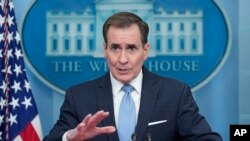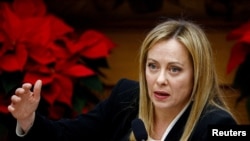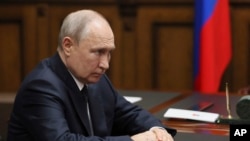The Biden administration is “concerned” about a recent Chinese hack targeting the websites of U.S. federal agencies but will “keep the lines of communication open,” John Kirby, National Security Council coordinator for strategic communications, said in an interview Thursday with VOA White House correspondent Paris Huang.
Kirby also elaborated on President Joe Biden’s comment Thursday that Russian President Vladimir Putin has “lost the war” in Ukraine, and he voiced strong concerns about reports of a mass grave found in volatile Sudan.
This interview has been edited for brevity and clarity.
VOA: Chinese hackers recently hit several federal agency sites, including the U.S. State Department. Is the White House concerned about the hacks, and what actions will the administration take?
John Kirby, National Security Council coordinator for strategic communications: Well, of course we're concerned about this intrusion. We took it seriously from the get-go, took actions immediately to protect our systems and to mitigate the damage here. It's under FBI investigation, so I'm not going to get into anything more specific on that.
VOA: What actions are you going to take if you can pinpoint who did this?
Kirby: We are constantly reevaluating our posture in cyberspace and in cybersecurity, and constantly making changes. I mean, our systems are attacked every single day from state and nonstate actors. We're going to continue to do what we need to do to protect ourselves.
VOA: How will this hack affect future high-level U.S. engagement with Beijing? As we know, after the Chinese spy balloon incident, Secretary of State Antony Blinken postponed his trip to Beijing.
Kirby: Again, this particular intrusion is under investigation. I'm not going to get into the topic of attribution at this point. What I would tell you is Secretary Blinken had a good set of discussions when he went to Beijing. [Treasury] Secretary [Janet] Yellen did, as well. As you know, special envoy for climate John Kerry will be going next month. We're going to try to keep these lines of communication open. We believe that that is the most responsible way to manage this very, very consequential relationship.
VOA: Italian Prime Minister Giorgia Meloni visits the White House on July 27. A White House statement said President Biden will talk to her about “closer transatlantic coordination regarding the People's Republic of China.” What areas of coordination are we talking about?
Kirby: I'm not going to get too far ahead of the meeting ... you can expect that they will talk about the full range of national security issues affecting both our countries. Italy is a very valuable NATO ally, and Italy has security challenges of their own there in southern Europe. And they, too, like so many NATO allies, have concerns about what the PRC is doing — whether it's unfair trade practices, whether it's cybersecurity, whether it's the growing economic influence they're trying to have in the Global South. We share a lot of the concerns that Italy has, and the president is looking forward to talking about all that.
VOA: North Korea just launched another missile and threatened to shoot down U.S. reconnaissance aircraft. How concerned is the White House that North Korea seems to get better and better in its missile technology?
Kirby: Clearly, we are concerned about North Korea's burgeoning ballistic missile program. And with each test, whether it succeeds or fails, they learn, and they try to improve. And that's a challenge. That's a growing threat to the peninsula, but also to our allies and our partners throughout the region. We continue to urge [Korean leader] Kim Jong Un to take us up on the offer of talks with no preconditions, to address the denuclearization of the Korean Peninsula. ... Short of that, President Biden has made it clear that we're going to continue to revitalize, reinvigorate, restore the strength of our alliances and partnerships, particularly with South Korea and Japan, improving our trilateral and their bilateral cooperation with one another so that we have the requisite military capability in the region to protect our interests and to protect our allies and partners.
VOA: President Biden just said he thinks Russian President Vladimir Putin has “lost the war.” What assessment from the White House made him say that?
Kirby: If you just take a look at any of the strategic goals that President Putin said he was after: He wanted to wipe Ukraine as an independent country right off the map. He wanted to take out the [Ukrainian President Volodymyr] Zelenskyy administration. He wanted to subjugate Ukraine and make it part of Russia as some sort of province. And he's achieved none of that. The other thing he wanted to do — and the president talked about this, as well — was divide the West, fracture NATO, show that there's disunity among the United States and our allies. And of course, he's gotten the opposite of everything. ... And as for the West, NATO is now two countries stronger ... and that's a real testament not just to Putin's activities, but to President Biden's leadership on the world stage.
VOA: In the language from the G7 Declaration, we notice that it doesn’t say “guarantees” but “assurances” for the security to Ukraine. Will the G7 leaders guarantee security assistance to Ukraine until they [Ukraine] join NATO?
Kirby: What we will do, G7 leaders, is provide security commitments to Ukraine for the long haul. And they [Ukraine] will be on a path to NATO membership. I can't give you a timeline for that. But in between the time, well, actually starting now until they become NATO members, those security commitments will continue, yes.
VOA: Can you talk about the mass grave found in Sudan?
Kirby: We are deeply troubled by reports that we're seeing that the Rapid Support Forces near West Darfur slaughtered and then buried in a mass grave more than 80 civilians, 80 innocent people. This is completely unacceptable, and the United States will be obviously taking this up with our allies and partners and with the U.N. But we condemn it. It's completely horrendous and unacceptable, and the Rapid Support Forces, they need to be held to account for this.






